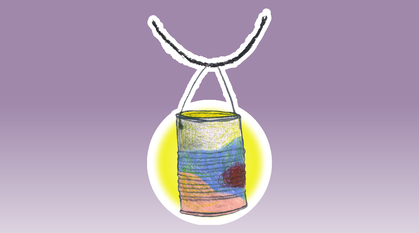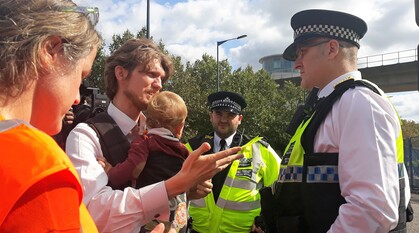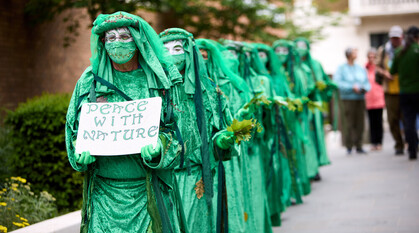What you can do to help stop the genocide in Gaza
Oliver Robertson shares what Friends in Britain can do to help stop the genocide in Gaza.
!["We use this word [genocide] with the aim of opening eyes, minds, and hearts. We use this word in the deep hope that the actions it describes will stop." (Minute 30: Gaza, Yearly Meeting 2025) Image: Anas-Mohammed / Shutterstock.com](/media/W1siZiIsIjIwMjUvMDUvMjkvMTMvNTYvMzEvOWIyOThkMTItMmJmZC00MTliLWIxNjItZTJmZmEzZGFjM2YxL1JhY2tNdWx0aXBhcnQyMDI1MDUyOS04LXBqNWNkYy5qcGciXSxbInAiLCJ0aHVtYiIsIjgyMHgxMjAwIl1d)
At Yearly Meeting 2025, Quakers were led to discern on the situation in Gaza.
The discernment, which took place over several sessions during the weekend, was deep, and hard, with many different voices heard. As the resulting Minute 30 (PDF) acknowledged, "We are deeply distressed by the conflict that we are praying over, and we have struggled with how to find unity".
What Quakers found unity on was a minute which focused on the immediate situation in Gaza, recognising that Quaker committees and Quakers in Britain have already made many statements over previous decades about the wider history and context, and calling for a just end to the Israeli occupation of Palestine.
In the statement, Quakers were led to say that we believe the Israeli government is committing genocide in Gaza. In doing so, we became the first church in the UK to say this.
You can read the full minute and statement here.
Minute 30 closed with the acknowledgment that "We know that making a statement is not enough". So now we have this discerned position, what can Friends do to help stop the genocide in Gaza?
Here are six actions Friends can take:
1. Write to your MP
"We acknowledge the historic and current role of the British state in creating the context of this conflict and the tragedy we see playing out." (Minute 30: Gaza, Yearly Meeting 2025)
In its January 2024 provisional measures in South Africa's genocide case against Israel, the International Court of Justice (ICJ) found that there was a “plausible risk" that genocide was being committed. As a third party state with obligations under the Genocide Convention, the British government must ensure that it is not enabling nor otherwise complicit in crimes being committed in Gaza. And yet, despite announcing a partial suspension of arms export licences in September 2024, and despite taking a stronger tone in their recent statements, our government has nevertheless continued to sell arms and components to Israel which are being used in Gaza.
Please share the Yearly Meeting statement with your MP and let them know that we need our government's complicity in the genocide and support for the Israeli government's actions to stop. You can ask your MP to write to the Prime Minister and Foreign Secretary and ask that the British government:
- Call for an immediate, permanent ceasefire and return of Israeli hostages and Palestinian prisoners.
- Immediately ban all arms sales, direct and indirect, that may be used by the Israeli military in Gaza, including components for F-35 fighter jets.
- Call for unrestricted humanitarian aid to flow into Gaza to avert an imminent famine. The UK government should actively support and work with UNRWA to lead Gaza's aid efforts and call on the Israeli government to rescind its recent laws and attacks against the agency. The UK government should reject the Gaza Humanitarian Foundation model and instead demand unrestricted access for all aid providers based on established humanitarian principles of impartiality, neutrality and independence.
- Send a clear signal that it upholds international law and its institutions by supporting the investigations at the International Court of Justice and International Criminal Court and enforcing the ICC's arrest warrants.
- Suspend the UK-Israel Trade and Partnership Agreement (TPA) in light of the Israeli government's genocide in Gaza and continued illegal occupation of Palestine. The TPA identifies “respect for human rights and democratic principles" as an “essential element" of the agreement. Suspending the agreement would halt the privileged trade terms established by the TPA, with trade between the countries (currently worth £5.8bn) continuing, but conducted via World Trade Organization rules.
- Pass urgent legislation to ban all UK trade with and investments in Israeli settlements and ban UK-based companies and financial institutions from engaging in business with settlements or their support structure, in light of the International Court of Justice's 2024 advisory opinion determination that the occupation of Palestine is illegal.
- Immediately recognise the state of Palestine and challenge all attempts to encourage and implement the ethnic cleansing and forced displacement of Palestinians in Gaza and the West Bank.
Minute 30 ends by saying, "We uphold those in positions of power and pray for them as they 'seek light on the road to peace'".
2. Check if your money is supporting genocide and occupation
"We draw Friends' and meetings' attention to Meeting for Sufferings minutes S/11/04/4 from April 2011, which asks Friends throughout Britain Yearly Meeting to boycott settlement goods, until such time as the occupation is ended, and MfS/18/10/19 from October 2018, which asks BYM to avoid investing in companies profiting from the occupation of Palestine." (Minute 30: Gaza, Yearly Meeting 2025)
It's up to all of us to ensure our money isn't being used to support the violence in Palestine and Israel. Are you buying products made in illegal Israeli settlements? Have you checked your local meeting's investments? Are you using financial services that are involved in the arms trade? Is your local council investing in companies profiting from the violence? If you're connected to another faith group, are their investments supporting the violence?
Check out these current campaigns and take action where you can:
- Download the Boycat app on your mobile phone to easily scan products in shops and learn whether the company selling them is involved in activities supporting the occupation.
- Our Friends at American Friends Service Committee (AFSC) and the Israeli human rights organisation Who Profits have searchable tools and databases to help you explore if your investments are going to companies profiting from the occupation.
- Join the Boycott Barclays Bank – Palestine Solidarity Campaign. You can read what Quakers have said about Barclays Bank and its investments in arms companies here: Honour your heritage by ending investment in arms to Israel, Quakers urge Barclays Bank.
- Email your local councillors and ask them to take action and divest for Palestine.
- Explore the Investing for Peace campaign calling on British churches to divest from companies profiting from the occupation.
3. Share this discernment and speak out
"We use this word [genocide] with the aim of opening eyes, minds, and hearts. We use this word in the deep hope that the actions it describes will stop." (Minute 30: Gaza, Yearly Meeting 2025)
Friends were clear in their hope that this discernment, and the language Yearly Meeting found unity on, would lead to change. Please share the statement with your friends, families and networks and use it as a starting point for conversations and discussions. Encourage them to read it in full, rather than just the headline.
Attending public events such as protests and vigils is another way of sharing our Quaker message publicly. It shows those on the receiving end of the violence that they are not being forgotten about. And it shows our leaders that we will keep on turning up and speaking out until policy is changed.
There are regular protests and vigils – small and large – being planned around the country calling for an end to the violence in Palestine and Israel. We've produced this advice for Friends who would like to attend a protest or vigil (PDF) but feel hesitant.
If you would like to join a WhatsApp group for Friends wishing to attending protests and events together, please email qpsw@quaker.org.uk.
Friends wishing to organise their own vigil can find advice on the Quakers in Britain website (PDF) on how to do so.
4. Reach out to your neighbours
"We ask Friends and meetings to reach out in love to Jewish people and communities they have connections with." (Minute 30: Gaza, Yearly Meeting 2025)
The statement speaks clearly about the pain this discernment might cause for some of our friends in Jewish communities. Minute 30 talks about the work we have to communicate this statement and reassure our friends in Jewish communities and other faiths who may be feeling fearful that they have our continued support and love. Are you active in local interfaith relations? Is there a Jewish group which uses your meeting house? Can you work with other Friends to consider how you might reach out to others in your community? You can read more about the interfaith work Quakers across Britain are engaging in and, if you'd like to get involved, you can email faithrelations@quaker.org.uk.
5. Learn about genocide prevention and atrocities elsewhere in the world
"We ask Friends to understand and learn about atrocities across the world." (Minute 30: Gaza, Yearly Meeting 2025)
Our long history of Quaker witness and peace work in Palestine and Israel gives us particular experience from which to speak on this issue. But Minute 30 was clear: "The fact that we are speaking about Gaza does not absolve us of our responsibility to learn about and respond to other atrocities around the world."
Impunity anywhere fuels injustice everywhere. Learn about the different stages of genocide and what can be done to end the cycle of genocide in our world. The Lemkin Institute for Genocide Prevention and Genocide Watch are two of the many organisations working to share prevention information and resources. Read their current country alerts to learn about atrocities happening elsewhere.
6. Build peace in your community
We know that the violence in Palestine and Israel is stretching community relations across the country. We hear when Friends and partners say they are struggling.
How can you work with others, reach out to others, and share your resources to help build a more peaceful community around you in these times?
Meeting houses can provide a much-needed space for discussion, reflection, and sanctuary during times of crisis. Some meeting houses near protest routes have opened their doors to provide a quiet and safe space for those who need it. Others have hired out their rooms to groups wishing to plan events or discuss what's happening in Palestine and Israel or to those needing respite from the pain they are experiencing.
We've received an increased number of questions from meeting houses over the last 19 months as Friends try to make informed and often quick decisions about who to hire their rooms out to. Here we share some of the key principles we use to guide our room lettings (PDF) in relation to Palestine and Israel, and which might be helpful for you as you make your own decisions.
Our Peacebuilding in Britain team at BYM is also here to talk through any challenges or ideas Friends may have in exploring what role Quakers can play in attending to divisions and conflict in our society. Please reach out to peacebuildinginbritain@quaker.org.uk to speak to us and to learn about online spaces Friends can join to find community on this.


